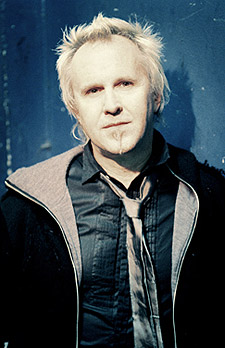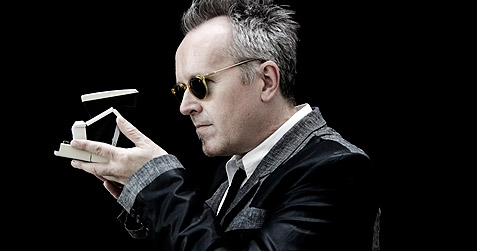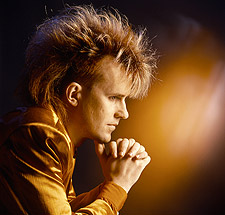
Interview Date: 08/30/2010
Run Date: 09/17/2010
Interviews Home / Music Home / Bullz-Eye Home
There are few musicians quite as readily associated with the ‘80s as Howard Jones, but the fact of the matter is that the man often referred to simply as HoJo continued his recording career into the ‘90s and beyond. Admittedly, his final album on Elektra – 1992’s In the Running – may have been the last time Jones troubled the charts in any significant way, but the quality of subsequent releases like Working in the Backroom (1994), People (1998) and Revolution of the Heart (2005) reveal that the man has in no way lost his ability to write a catchy pop tune.
Bullz-Eye had the opportunity to chat with Jones in connection with his latest album, Ordinary Heroes, and we asked him about being an indie artist in today’s economic climate, received a bit of clarification on how he’s evolved as a musician over the course of his career, and got some belated insight into exactly what he was on about in “No One Is To Blame.” First, though, we had to battle through an ultimately futile attempt to do the interview via Skype. Within moments, the static proved impossible for me to decipher anything Jones was saying, but as he had already feared this might happen, he quickly offered to call me at home via his landlineHoward Jones: How’s that? Is that better?
Bullz-Eye: That is much better, yes. (Laughs) Thank you very much.
HJ: All right, then! Great!
BE: So, yes, as I was saying, it’s great to have you back with a studio album
HJ: Yes, thanks. It’s quite hard to get into the studio and concentrate and get it done, because it’s such an effort to make an album where you feel happy with all the songs and all the tracks. And I’m doing loads of touring at the moment, and, you know, that takes a lot of time and energy doing all that. So making an album actually gets harder. But, also, because we live in a climate now where…I mean, record sales are so low. You have to really think about your core fans. They’re the ones that are going to buy the records. But for me, it’s really important to keep making new songs, to keep doing it. Otherwise, you just stop dead as an artist. It’s really important to keep doing new stuff.
BE: You and I did an E-mail interview a few months ago, and you made a comment about how you’re very proud of the fact that Ordinary Heroes is a songwriter’s album, which may surprise those who think of you solely as a synth-pop guy. What was your musical background prior to the synth era? Did you train on piano originally?
HJ: Yeah, I started playing the piano when I was seven, and I had piano lessons right up until when I was 21. I went into music college in the north of England, the Royal Northern College of Music, when I was 18, so, yeah, I was properly trained on piano. But my love and passion was always pop music and rock music, so I always saw the classical training as sort of a means to an end.
BE: To fall back on an old chestnut of a question, I’m curious who your influences were.
HJ: Well, as a keyboard player, it was Keith Emerson. He was my hero, because he made keyboard playing exciting. Also, because he did all of those classical pieces, and I trained as a classical piano player, so I related to that a lot. And then you’ve got Stevie Wonder for the funky keyboard playing and the innovative use of synthesizers. Wonderful grooves. So you’ve got those two as my biggest keyboard influences. And then for songwriting, it would be Elton John and…oh, who else can I say? Don Henley is my favorite American songwriting. So those two were big influences. Although I’m associated often as being an electronic musician, I’m a songwriter, really, so those are the ones who’ve been the most influential.
BE: How would you describe your musical evolution over the years? I mean, I’ve been there all along, so I’ve been witness to it, but how would you describe it to someone who hasn’t been following your work?
 HJ: Well, I’ve always been… (Hesitates) When I was a teenager, I played in bands, and I used to write very complicated instrumental music for the bands I was in. And then synthesizers came around when I was about 21, and for the first time they were affordable, and anything with keys on it, anything with a keyboard, I just loved. And I had this idea for doing, like, a one-man orchestra, using synthesizers and drum machines and sequencers, and I just launched into that idea, really. Also, I immediately went out and played with it live. Although it was all very electronic, I based it all around playing live, so I could get feedback from an audience and get that excitement. So I got signed on the basis of my electronic one-man band and my songs, but I’ve always been a songwriter, primarily, even though it may be dressed up as electronic one time and a rock band another time. With this album, it’s quite acoustic. Really, it’s the songs that I’m most proud of and most passionate about, if you took everything else away.
HJ: Well, I’ve always been… (Hesitates) When I was a teenager, I played in bands, and I used to write very complicated instrumental music for the bands I was in. And then synthesizers came around when I was about 21, and for the first time they were affordable, and anything with keys on it, anything with a keyboard, I just loved. And I had this idea for doing, like, a one-man orchestra, using synthesizers and drum machines and sequencers, and I just launched into that idea, really. Also, I immediately went out and played with it live. Although it was all very electronic, I based it all around playing live, so I could get feedback from an audience and get that excitement. So I got signed on the basis of my electronic one-man band and my songs, but I’ve always been a songwriter, primarily, even though it may be dressed up as electronic one time and a rock band another time. With this album, it’s quite acoustic. Really, it’s the songs that I’m most proud of and most passionate about, if you took everything else away.
BE: I was very glad to see that you’d rescued “Someone You Need” from Perform ’00 and given it another lease on life with the new album.
HJ: Yes! It’s a beautiful song I wrote that, you know, with Duncan Sheik in France. We were on one of these songwriters’ retreats, and…we were friends before that, but we actually got to write something together. I think it’s a little gem, that song. I really hope that somebody more famous than myself covers it one of these days. (Laughs)
BE: If my wife and I had heard it prior to our wedding, I’m sure it would’ve been our first dance. It’s just that kind of song.
HJ: Oh, that’s nice. Thank you!
BE: So you obviously like “Someone You Need,” but what are some of your other favorite songs on Ordinary Heroes?
HJ: Well, you know, I’m very, very picky about what goes on the albums, so I don’t want anything to be on there that I only half love. So I love them all. But, yes, “Someone You Need” did turn out particularly well, I think, and…”Say It Like You Mean It” is another favorite. “Soon You’ll Go,” with the Welsh choir, is a real special track for me as well.
BE: You had a co-writer on several songs: Cori Josias. How did you come to be songwriting partners?
HJ: Well, Cori is an American lady living in London, and we were both Buddists, so we actually met because we wrote kind of a Buddhist song for our organization. And we thought we should continue writing together, because there’s a really good chemistry. I think it’s really great to write with a lady writer, because it gives you that male and female perspective. I think it worked really well, and it’s a real pleasure to work with her. She’s a real artisan, if you know what I mean. She’s very meticulous about everything, especially lyrically, so that was a good discipline for me, because I’m not so disciplined with the lyrics. I just let them take me where I want to take them. (Laughs) But with her, everything had to be very, very precise, and that was a good influence on me.
BE: How do you go about deciding who to co-write with? For instance, there’s Duncan, and you’ve written with Jane Wiedlin as well, on “Tomorrow is Now.”
HJ: Well, I mean, it’s really circumstantial. Jane, like Duncan, I met on the songwriters’ retreat, so we got put together and really got on well. I don’t really write with many people. It’s usually someone who really strikes me as someone I can get on with very well. It’s a rare thing to co-write. But it’s really good fun!
BE: How goes life as an indie artist these days? Is it more financially successful for you? Because I’ve heard it said that it can be more lucrative than being on a major label, simply by virtue of the structure.
HJ: Yeah, well, you know, I’ve been independent since 1990… (Laughs) …and I just love it! It works very well financially, and it also works very well creatively, because you have to be involved with all aspects of your output. It also puts the responsibility on you to set the agenda. There’s nobody nagging me to put out an album, and there’s nobody sort of saying, “You’ve got to do this by then, or else.” I think it leads you to be creative in some many ways, being involved in videos and artwork and photographs, and also in the way you present your albums to the fans. What it’s made me do is really, really establish a strong connection with my fanbase, to really appreciate them and really listen to them. I think that’s a great way forward for artists, to have that real partnership with the fans, and I’ve been really keen to establish that. Also, I really try and encourage other artists to do the same thing, because, really, we now have the power to be completely independent, to be very successful , and to make a good living. It just depends on how hard you’re content to work and how passionate you are about doing this. So I think it brings out all the best things in people, really. I totally recommend it to anyone. Being in charge of your own destiny: it’s what I’ve always been talking about in my lyrics, and I’m doing it now with the business side of it as well.
BE: I’d guess that it also brings more of a sense of accomplishment, knowing that you yourself are directly responsible for any new fans that you may bring to this material.
HJ: Yes, absolutely. And, you know, you’re trying to invent creative ways to get the music over to a broader audience and keeping the quality really high. Even though your budgets are smaller than a big label’s, you’re finding ways to keep the standards up and maintaining a high quality. I just love it. It really suits me.

BE: I know you mentioned that you’re very much a perfectionist when it comes to your studio albums. Is there a certain point when you feel like you’ve gotten in the kick in the arse, as it were, to do another record? Because, obviously, you did the Perform ’00, you’ve done a couple of live albums…
HJ: Yeah, I’m thinking of ways now to set myself an agenda, where I’ve got to do work by a certain time. I’m thinking that, in the next year, I’ll say to the fans, “I’m going to produce a track a month, and I’m going to release it to you each month, and then after 10 or 12 months, I’ll release the whole collection as an album.” But I think that, in that way, it will give me a timetable that I really should stick to, because I’ve made a promise to them. (Laughs) I mean, it’s not that I’m lazy or anything! I’m always working. But because I’m touring so much, it’s very hard to get focused on producing new works. So I’m going to try this experiment last year of saying, “Right, I’m going to do a track every month and release it.” And at the end of the year, we’ll have a whole album.
BE: To jump back in time, a friend of mine had a very precisely worded question that he wanted me to ask, and since it made me laugh, I wanted to reproduce it word for word.
HJ: (With a bit of trepidation) Okayyyy…
BE: In regards to “No One Is To Blame,” can you speak to the experiences that caused you to pen this classic, which exemplifies the necessity of the duality of life and juxtaposes that duality in a manner that was both easily understood and had a depth that was more esoteric in nature?
 HJ: (Bursts out laughing) Well, you know, it’s interesting with “No One Is to Blame,” because it tries to be honest, that song. It’s saying to people that it’s difficult to be a human being because we’re pulled by our positive influences and our negative influences, and we have to make sense of it. It’s not… (Hesitates) It’s just part of life, isn’t it? You can’t be perfect, but it’s good to admit to what goes on in your head. Especially for men, I think. “You can look at the menu, but you just can’t eat.” There’s lots of things you’d like to do, there’s lot of people that you might like to be with, but it’s just not going to work out practically. You have to be disciplined, you have to be realistic, and you have to pay the price if you get it wrong. I think that song sort of explores all of that stuff. I think that’s what he’s getting at with his question.
HJ: (Bursts out laughing) Well, you know, it’s interesting with “No One Is to Blame,” because it tries to be honest, that song. It’s saying to people that it’s difficult to be a human being because we’re pulled by our positive influences and our negative influences, and we have to make sense of it. It’s not… (Hesitates) It’s just part of life, isn’t it? You can’t be perfect, but it’s good to admit to what goes on in your head. Especially for men, I think. “You can look at the menu, but you just can’t eat.” There’s lots of things you’d like to do, there’s lot of people that you might like to be with, but it’s just not going to work out practically. You have to be disciplined, you have to be realistic, and you have to pay the price if you get it wrong. I think that song sort of explores all of that stuff. I think that’s what he’s getting at with his question.
BE: Hey, your guess is as good as mine. (Laughs)
HJ: I will say that, if you do get it wrong, you shouldn’t spend your whole life feeling guilty. Let’s just move on and get it right next time. There’s no point in feeling guilty about stuff, because it’s not very productive. You just have to go, “Look, I’ve got it wrong, I’m going to move on and get it right next time.”
BE: I’ll wrap up with this one, because I know you’ve got another interview coming up, but I was wondering if there’s a single that you’ve released that didn’t do as well as you thought it should have…and, conversely, if a song was ever picked as a single that you hadn’t envisioned as being one.
HJ: Well, the song that I think really should’ve been a big hit in America was…well, there’s two, actually. One is “The Prisoner,” which I think is a brilliant song. I just love it. And the other one is “Lift Me Up,” which…actually, it was really heavily added at radio in America, but then the record company dropped it, and it didn’t really see its full potential. But all of the rest of them…I mean, I was very involved in the choice of singles, so I can’t complain about that at all. They’re what I wanted, and I was fine with them.
BE: Well, I think that’s about it, but I did just want to mention that you have a special spot in the life of my wife and I: we saw you perform while we were on our honeymoon in the UK. In fact, we’ve since become (virtual) friends with Shaz Sparks on Facebook.
HJ: Oh, right! Very cool!
BE: So it’s been very nice to be able to talk to you one on one at last. Thank you very much, Howard!
HJ: Oh, thank you very much. All the best!
You can follow us on Twitter and Facebook for content updates. Also, sign up for our email list for weekly updates and check us out on Google+ as well.












